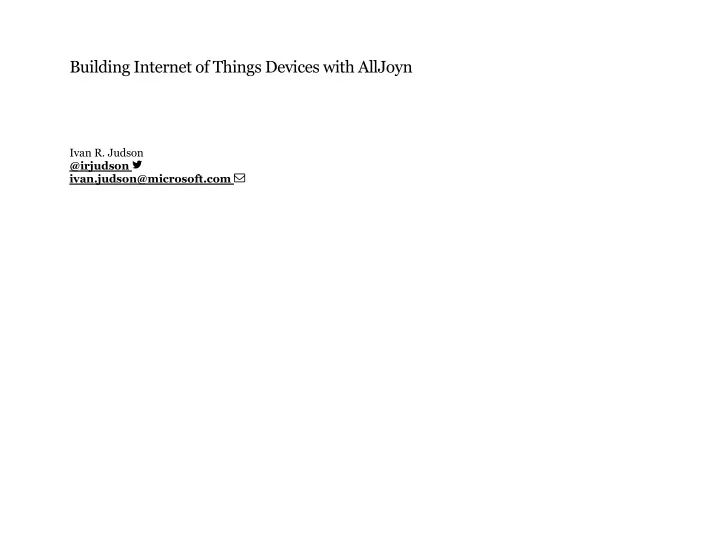

Building Internet of Things Devices with AllJoyn Ivan R. Judson @irjudson ivan.judson@microsoft.com
IoT Service Architecture
IoT Mapping Skills
What's Missing?
What is AllJoyn? AllJoyn is... a system that allows devices to advertise and share their abilities with other devices around them. a protocol that your devices can use to interact intelligently. a library you can include in your software to make smarter devices.
AllJoyn System Architecture Gateways. Routers. Services. Clients.
AllJoyn Gateway Remote access and management Interoperability Supports open standards: REST, XMPP, MQTT and TR-069.
AllJoyn Router Connect Services and Clients. Cache transient information. Allow for arbitrary topology.
AllJoyn Service Discoverable. Expose interfaces. Interfaces are exposed in detail.
AllJoyn Client Connect to Services Expose Services to other Services Expose Services to Users
AllJoyn Standard vs Thin Library Standard Thin Mobile, Laptop RTOS C++, C, Java, JavaScript, Objective-C C Router optional No Router
Microsoft & AllJoyn
AllJoyn inside Windows 10!
Support in Visual Studio AllJoyn Studio plugin
AllJoyn Cordova Plugin & Apps The Open Source Cordova Plugin
Example Heatworks
Heatworks Architecture
Heatworks Implementation
Control Interface Control Range Units Set Point 75-130 Degrees F Current Temperature 40-160 Degrees F Current Amps 0-50 Amps Total Time 0-MAXINT Seconds Total Amps 0-MAXINT Amps Special Modes 0-255 Bitmask Presets Undefined Undefined
AllJoyn Interface <node name="/control"> <interface name="com.myheatworks.model1"> <method name="setPoint"> <arg name="temp" type="y" direction="in"> </arg></method> <method name="currentTemp"> <arg name="temp" type="y" direction="out"> </arg></method> <method name="softCurrentLimit"> <arg name="current" type="y" direction="in"> </arg></method> <method name="currentDrawInstant"> <arg name="current" type="y" direction="out"> </arg></method> <method name="timeOdometerValue"> <arg name="time" type="i" direction="out"> </arg></method> <method name="currentOdometerValue"> <arg name="current" type="i" direction="out"> </arg></method> </interface> </node>
Common Definitions #define CONNECT_ATTEMPTS 10 /* All times are expressed in milliseconds. */ #define CONNECT_TIMEOUT (1000 * 60) #define UNMARSHAL_TIMEOUT (1000 * 5) #define SLEEP_TIME (1000 * 2) #define METHOD_TIMEOUT (100 * 10) static const char ServiceName[] = "com.myheatworks.model1"; static const char ServicePath[] = "/control"; static const uint16_t ServicePort = 25; /* * Buffer to hold the full service name. This buffer must be big enough to hold * a possible 255 characters plus a null terminator (256 bytes) */ static char fullServiceName[AJ_MAX_SERVICE_NAME_SIZE]; /** * The interface name followed by the method signatures. * * See also aj_introspect.h */ static const char* const sampleInterface[] = { "com.myheatworks.model1", /* The first entry is the interface name. */ "?setPoint temp<y", /* Set the water temperature */ "?currentTemp temp>y", /* Get the water temperature setting */ "?softCurrentLimit current<y", /* Set the soft current limit */ "?currentDrawInstant current>y", /* Get the current draw at this instant */ "?timeOdometerValue time>i", /* Get the number of seconds the unit has been running. */ "?currentOdometerValue current>i", /* Get the integral of amps where dt = 4 seconds */ NULL };
Service Implementation #define AJ_MODULE MODEL1_SERVICE #include <stdio.h> #include <aj_debug.h> #include "alljoyn.h" #include "model1.h" uint8_t dbgMODEL1_SERVICE = 0; /* * The value of the arguments are the indices of the * object path in AppObjects (above), interface in sampleInterfaces (above), and * member indices in the interface. * The first index is 1 because the first entry in sampleInterface is the interface name. * This makes the first index (index 0 of the methods) the second string in * sampleInterface[]. * * See also aj_introspect.h */ #define BASIC_SERVICE_SETPOINT AJ_APP_MESSAGE_ID(0, 0, 0) #define BASIC_SERVICE_CURRENT_TEMP AJ_APP_MESSAGE_ID(0, 0, 1) #define BASIC_SERVICE_SOFT_CURRENT_LIMIT AJ_APP_MESSAGE_ID(0, 0, 2) #define BASIC_SERVICE_CURRENT_DRAW_INSTANT AJ_APP_MESSAGE_ID(0, 0, 3) #define BASIC_SERVICE_TIME_ODOMETER AJ_APP_MESSAGE_ID(0, 0, 4) #define BASIC_SERVICE_CURRENT_ODOMETER AJ_APP_MESSAGE_ID(0, 0, 5) int main(int argc, char **argv) { AJ_Status status = AJ_OK; AJ_BusAttachment bus; uint8_t connected = FALSE;
Client Implementation #define AJ_MODULE MODEL1_CLIENT #include <stdio.h> #include <stdlib.h> #include <aj_debug.h> #include <alljoyn.h> #include "model1.h" uint8_t dbgMODEL1_CLIENT = 0; /* * The value of the arguments are the indices of the * object path in AppObjects (above), interface in sampleInterfaces (above), and * member indices in the interface. * The first index is 1 because the first entry in sampleInterface is the interface name. * This makes the first index (index 0 of the methods) the second string in * sampleInterface[]. * * See also aj_introspect.h */ #define BASIC_CLIENT_SETPOINT AJ_PRX_MESSAGE_ID(0, 0, 0) #define BASIC_CLIENT_CURRENT_TEMP AJ_PRX_MESSAGE_ID(0, 0, 1) #define BASIC_CLIENT_SOFT_CURRENT_LIMIT AJ_PRX_MESSAGE_ID(0, 0, 2) #define BASIC_CLIENT_CURRENT_DRAW_INSTANT AJ_PRX_MESSAGE_ID(0, 0, 3) #define BASIC_CLIENT_TIME_ODOMETER AJ_PRX_MESSAGE_ID(0, 0, 4) #define BASIC_CLIENT_CURRENT_ODOMETER AJ_PRX_MESSAGE_ID(0, 0, 5) void SetPoint(AJ_BusAttachment *bus, uint32_t sessionId, uint8_t setPoint) { AJ_Status status = AJ_OK; AJ_Message msg;
Bringing the Peer to Peer Web to all your Devices with Node.js Wedensday, April 6th, 2016, 11:05am - 11:55am, in Harbor F In other news... Bash on windows... Toyota Connected...
Thanks! Ivan R. Judson, PhD irjudson @irjudson ivan.judson@microsoft.com
Recommend
More recommend